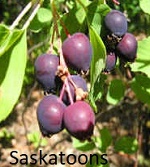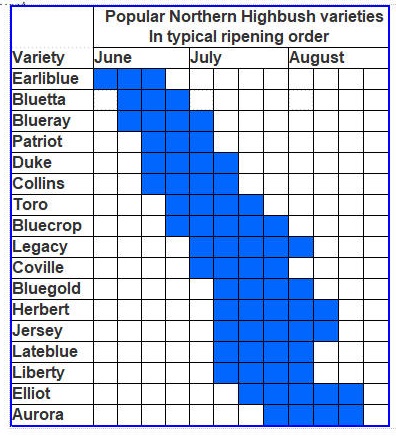
Warning: include(includes/introtopic.php): failed to open stream: No such file or directory in /home/picky2/public_html/blueberry/blueberry-varieties-ripening table.php on line 145
Warning: include(): Failed opening 'includes/introtopic.php' for inclusion (include_path='.:/opt/cpanel/ea-php71/root/usr/share/pear') in /home/picky2/public_html/blueberry/blueberry-varieties-ripening table.php on line 145
Blueberry Varieties - Characteristics, Ripening Order and More
Blueberry Varieties
The first cultivated blueberries were developed in New Jersey in the early 1900's. Since, many plant breeders have developed new varieties, suitable for growing in almost all parts of North America and Europe. They have different ripening dates, flavor variations and even different colors, aside from blue!
Major branches of the blueberry
There are 3 main types of blueberries:
- Northern Highbush blueberry varieties which grow best in the northern U.S. and Canada
- Southern Highbush blueberries doe well in moderate areas like southern parts of the north and the northern parts of the South (think TN, KY, VA, NC, and west coast)
- Rabbiteye Blueberries are best suited for the Southeast, and the Southern Hemisphere.
- Lowbush - typically wild varieties. More commonly grown in Maine and other parts of New England. Intense flavor.
Similar berries:
While the true blueberry is a native American, there are similar
berries around the world. Most are closely related to blueberries
- Aroniaberries -
- Bilberries - smaller cousins of the blueberry in Europe
- Bblaeberry in Scotland and Ireland, smaller, intense flavor; like a bilberry-
- Honeyberries -
- Huckleberries - larger blue berries, a bit less sweet, common to the northern US and Canada
- Saskatoons - Canadians know about Saskatoons. They are native to western Canada and the northwest of the U.S.. They are larger, a bit less sweet; almost identical to a Huckleberry, with a hint of apple.
- Serviceberries - another name for Saskatoons
- Whorlberry or whortleberry grown in the United Kingdom. Much like a bilberry.
Varieties of Blueberries in general order of ripening
Since the varieties planted are selected for the climate and area, we've grouped these to be most useful to you, by their general type followed by order of ripening.
Northern Highbush Blueberries
Northern highbush blueberries are generally self-fertile; but you'll get larger and earlier ripening berries if you plant several different cultivars (varieties) close by for cross-pollination. For those in the northeast, see Rutgers University Blueberry Growing Guide
Alphabettical by season
|
Popular Northern Highbush varieties In typical ripening order |
||||||||||||
|---|---|---|---|---|---|---|---|---|---|---|---|---|
| Variety | June | July | August | |||||||||
| Earliblue | ||||||||||||
| Bluetta | ||||||||||||
| Blueray | ||||||||||||
| Patriot | ||||||||||||
| Duke | ||||||||||||
| Collins | ||||||||||||
| Toro | ||||||||||||
| Bluecrop | ||||||||||||
| Legacy | ||||||||||||
| Coville | ||||||||||||
| Bluegold | ||||||||||||
| Herbert | ||||||||||||
| Jersey | ||||||||||||
| Lateblue | ||||||||||||
| Liberty | ||||||||||||
| Elliot | ||||||||||||
| Aurora | ||||||||||||
Early season
- Bluetta - very hardy, small dark berries
- Collins - Large, firm berries with good good aroma, good dessert quality
- Duke - First to ripen, large, easy to pick. Mild, low acidity. Picked in two main pickings.
- Earliblue - Large, firm berries with good aroma and good flavor
- Hannah's Choice - medium large fruit with high sugar content, firmer, better flavored than Duke.
- Patriot - Large, firm, aromatic berries with very good flavor
- Reka - Medium size with strong huckleberry-like flavor, very high yields
- Spartan - firm and very large, very good flavor. later than other early varieties, large crop.
- Sunrise - Large size and excellent flavor, not as heavy yielding as Duke
Late Early to early Mid-season
- Pemberton - Medium- o deep blue large berries
- Toro - large size, easy to pick, good flavor.
Mid-season
- Berkeley - light blue, firm and very large with very good storing but only average flavor
- Bluecrop - Medium to large size, variable picking; old variety taste.
- Bluehaven -
- Bluejay - moderate crops of medium, sized, high quality fruit
- Blueray - medium size with good flavor and high yieldsl
- Cara's Choice - medium sized fruit with 30% more sugar than Duke or Bluecrop and the berries last on the plant for an extended period.
- Chippewa - large firm fruit, productive and winter hardy
- Draper - very good fllavor
- Hardyblue - Small size but easy to pick; sweetest berry. Good for cooking.
- Legacy - Large, firm, sweet, aromatic, excellent flavor and stores well
- Northland - medium sized, dark,soft berries; extremely productive
- Nui - Very large size and excellent flavor but light yields
- Olympia - Medium to small size, excellent flavor
- Patriot - large, firm berries, early bloom, but midseason ripening.
- Sierra - large firm berries
Mid to late season
- Bluegold - Medium to large size, yields vary from season to season
- Chandler - Very popular due to its large size and good flavor.
- Darrow - Their size varies, easy to pick; excellent flavor. /li>
- Nelson - Large size, very good flavor, the berries can stay on the bush for extended periods.
- Rubel- derived from a wild variety, small, firm, dark berries, similar to low bush varieties,
Late season
- Aurora - a new variety, 5 days after Elliot; firm , large berries that store well; very good yield.
- Brigitta - large, firm, flavorful fruit that stores well. The plant grows late into the fall
- Coville - Large, firm, highly aromatic, tart, very good flavor
- Elliot - Late season, large size, easy to pick; tart flavor. Very good shelf life, 30-45 days in a fridge, Beware not to pick early, turns blue before ripe.
- Liberty - ripens 5 days before Elliot with better flavor. Stores well
- Jersey - an old cultivar dating to 1928, small, soft berries
Southern Highbush Blueberries
Don't let the name fool you; while these can be grown in hot climates, they are still more difficult than rabbiteye varieties and are better suited for warmer areas of the North. You should plant several different cultivars (varieties) close by for cross-pollination
Early season:
- Suziblue
- Palmetto
- O'Neal
Mid-season
- Camellia
- Jubilee
- Magnolia
Rabbiteye Blueberry Varieties
Be sure to plant more than one variety for cross-pollination to ensure good fruit setting. This is important for Rabbiteye's! See this UGa article for information about growing rabbiteye blueberries Also, this artiicle by TTexas A and M has more Rabbiteye Blueberry Growing information. And for those on the west coast, see this SFGate Article about Rabbiteye Varieties
Early season/p>
- Austin - large, blue firm berries with good flavor,
- Alapaha - medium sized with good flavor and smaller seeds
- Climax - large, medium-dark blue and good flavor.
- Delite - small and light blue, pretty but not a consistent producer
- Montgomery - very productive, medium to large berries, good firmness and flavor
- Premier - Large berries with good flavor. The plants are vigorous, disease resistant, and productive.
- Prince - blooms a few days before Climax, medium sized berries, with good color, firmness and flavor
- Savory - large berries with light blue color, and good firmness and flavor, but the plant is susceptible to fungus.
- Titan - largest berries
- Vernon - large berries
- Woodard - large, light blue.
Late early to early mid-season
- Briteblue - moderately vigorous, firm, large, light blue berries, good producer.
Mid-season
- Brightwell - medium in size, medium blue color, vigorous plants that produce many new canes
- Garden Blue - very small, light blue berries
- Powderblue - disease-resistant, and productive, similar to Tifblue but more leafy plant, holds up to rainy periods better
- Tifblue - large, round, light blue, sweet, very firm, stays good on the plant for days, most productive of all rabbiteye varieties
Late season
- Baldwin - good flavor and firm, dark blue fruit; with a long ripening period; good for home gardeners and U-pick
- Centurion - Ripens after Tifblue; good flavored berries, medium firmness, darker than Tifblue..
- Ochlockonee - medium sized with good flavor and smaller seeds
- SSharpblue - developed at the University of Florida for areas receiving 600 hours or less of temperatures below 45 degrees.
New Pink Rabbiteye Varieties
- Pink Lemonade - Pink blueberries, with a great, very sweet flavor
- 'Pink Champagne - Even better than pink Lemonade, in my opinion; more antioxidants and sweeter than blue blueberries.
Lowbush varieties
Generally only growing up to 18 inches tall
- Top Hat is- used for ornamental landscaping
- Ruby carpet - grows well in USDA zones 3-7.
Looking for canning equipment and supplies?
Water bath canner with a jar rack
Pressure canners for gas, electric and induction stoves: Presto 23Qt or T-fal 22Qt
Canning scoop (this one is PERFECT)
Ball Blue book (most recent version)
Jars: 8oz canning jars for jams
Find Other types of farms:
Farm markets and roadside stands
Road trips and camping resources
Local Honey, apiaries, beekeepers
Consumer fraud and scams information
Home canning supplies at the best prices on the internet!
Maple Syrup Farms, sugarworks, maple syrup festivals
Environmental information and resources
Farms For Your Event for birthday parties, weddings, receptions, business meetings, retreats, etc.
Festivals - local fruit and vegetable festivals
Get the
most recent version of
the Ball Blue Book
Get the
most recent version of
the Ball Blue Book of Home Canning
Find other types of farms:
- Easter egg hunts
- Children's consignment sales
- Farm markets and roadside stands
- Local Honey
- Local Meat, Milk and Eggs
- Road trip and camping
- Pumpkin patches and corn mazes
- Christmas Tree Farms and lots
- Maple Syrup farms and sugarworks
Highly rated canning supplies:
- Regular Mouth Canning Lids with food-grade with BPA Free Silicone seals for Ball, Kerr Jars for Canning
- Canning accessories kit: funnel, jar tongs, lid lifter, etc
- Food Dehydrator, 400W Electric with 8 Trays, 48 hour Timer and Temperature Control 95-176℉, BPA-Free
- Water Bath Canner, 21 Qts with lid, Jar Rack, Speckled Black, cans 7 quart jars, 9 pint jars or 13 half-pint jars
- Air Fryer: Instant Pot Instant Vortex Plus XL 8QT Clear Windows, Custom Programming, 8-in-1 Functions that Crisps, Broils, Roasts, Dehydrates, Bakes, Reheats
-
- Most recent version of the Ball Blue Book
- The Backyard Homestead:a guide to homesteading , on 1/4 acre, how to raise grains and vegetables; raise animals for meat, eggs, and dairy; and keep honey bees
- Smart silent HEPA Air Purifiers for Home, Large Rooms for Allergies, Smoke, Pets. Eliminates 99.97% of Dust, Pet Hair, Odors

